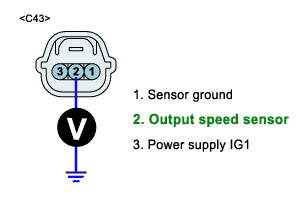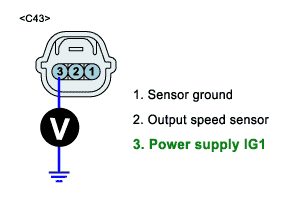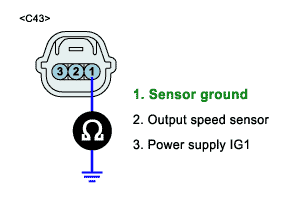Has a problem been found?
YES
Repair as necessary and go to "Verification Vehicle Repair" procedure
NO
Go to "Signal Circuit Inspection" procedure
Many malfunctions in the electrical system are caused by poor harness and terminals. Faults can also be caused by interference from other electrical systems, and mechanical or chemical damage.
Thoroughly check connectors for looseness, poor connection, bending, corrosion, contamination, deterioration, or damage.
Has a problem been found?
YES
Repair as necessary and go to "Verification Vehicle Repair" procedure
NO
Go to "Signal Circuit Inspection" procedure
Ignition "ON" & Engine "OFF".
Disconnect the "OUTPUT SPEED SENSOR" connector
Measure voltage between terminal "2" of the OUTPUT SPEED SENSOR harness connector and chassis ground .
Specification : approx. 5V

Is voltage within specifications ?
YES
Go to "Power Circuit Inspection" procedure
NO
Check for open or short in harness. Repair as necessary and Go to "Verification Vehicle Repair" procedure
If signal circuit in harness is OK, Go to "Check PCM/TCM" of the "Component Inspection" procedure.
Ignition "ON" & Engine "OFF".
Disconnect the "OUTPUT SPEED SENSOR" connector
Measure voltage between terminal "3" of the OUTPUT SPEED SENSOR harness connector and chassis ground .
Specification : approx. B+

Is voltage within specifications ?
YES
Go to "Ground Circuit Inspection" procedure
NO
Check for open in harness. Repair as necessary and Go to "Verification Vehicle Repair" procedure
Ignition "ON" & Engine "OFF".
Disconnect the "OUTPUT SPEED SENSOR" connector
Measure resistance between terminal "1" of the OUTPUT SPEED SENSOR harness connector and chassis ground .
Specification : approx. 0 Ω

Is resistance within specifications ?
YES
Go to "Component Inspection" procedure
NO
Check for open in harness. Repair as necessary and Go to "Verification Vehicle Repair" procedure
If ground circuit is OK, Go to "Check PCM/TCM" of the "Component Inspection" procedure